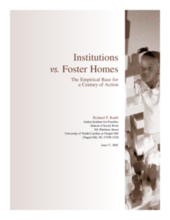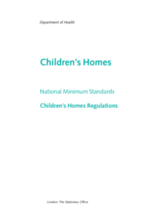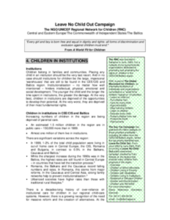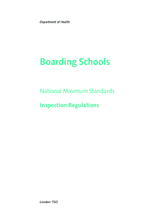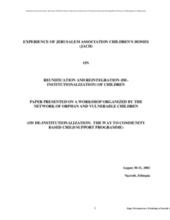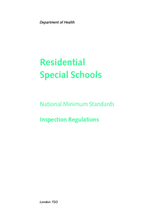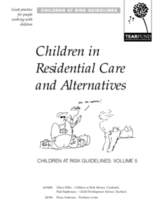Displaying 1421 - 1430 of 1465
Country report of Russia on the situation of children in residential care in anticipation of the Second International Conference on Children and Residential Care: New Strategies for a New Millennium, to be held in Stockholm 12 – 15 May 2003.
A review of institutional care and family-centered care with a discussion of both positive and negative aspects of group care. This review paper is primarily focused on showing the inefficacy of group care and recommending other forms of care such as kinship care and even foster care as options that are more cost effective and better for children’s development.
A set of standards for ensuring positive welfare, health and education in children’s homes. It includes standards and outcomes on planning for care, quality of care, complaints and protection, care and control, environment, staffing, management and administration, and specialist provision.
This paper examines the negative impact of institutional care in central eastern Europe, the Commonwealth of Independent States and the Baltics region. It promotes community-based care alternatives and provides statistics. It also includes a list of useful resources addressing orphaned and vulnerable children.
A set of standards for ensuring welfare protection at boarding schools. It includes standards and outcomes that outline a school’s welfare policies and procedures, organization and management, welfare support to boarders, staffing, and premises.
This paper provides a guideline for the implementation of reunification and reintegration programs for agencies providing institutional care for orphans. It outlines the different strategies and activities an organization in Ethiopia used to transition from institutional care to community-based childcare projects.
A set of standards for ensuring the welfare protection of children in residential special schools. It includes standards and outcomes relating to children’s rights, protection, and care, as well as staffing, organization and management.
Country report of Vietnam on the situation of children in residential care in anticipation of the Second International Conference on Children and Residential Care: New Strategies for a New Millennium, to be held in Stockholm 12 – 15 May 2003.
A series that provides a framework for good practice and guidelines for those who work in the area of child development policy. The series delves particularly into residential care and other alternatives of care and makes suggestions for reform by evaluating 6 case studies of good practice examples.
Country report of India on the situation of children in residential care in anticipation of the Second International Conference on Children and Residential Care: New Strategies for a New Millennium, to be held in Stockholm 12 – 15 May 2003.


